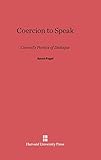Coercion to Speak : Conrad's Poetics of Dialogue / Aaron Fogel.
Material type: TextPublisher: Cambridge, MA : Harvard University Press, [2013]Copyright date: ©1985Edition: Reprint 2013Description: 1 online resource (284 p.)Content type:
TextPublisher: Cambridge, MA : Harvard University Press, [2013]Copyright date: ©1985Edition: Reprint 2013Description: 1 online resource (284 p.)Content type: - 9780674334205
- 9780674334212
- 823/.912
- online - DeGruyter
| Item type | Current library | Call number | URL | Status | Notes | Barcode | |
|---|---|---|---|---|---|---|---|
 eBook
eBook
|
Biblioteca "Angelicum" Pont. Univ. S.Tommaso d'Aquino Nuvola online | online - DeGruyter (Browse shelf(Opens below)) | Online access | Not for loan (Accesso limitato) | Accesso per gli utenti autorizzati / Access for authorized users | (dgr)9780674334212 |
Frontmatter -- Acknowledgments -- Contents -- I. Ideas of Dialogue and Conrad's Forced Dialogue -- II. Dialogue and Labor -- III. Silver and Silence: Dependent Currencies in Nostromo -- IV. The Fragmentation of Sympathy in The Secret Agent -- V. The Anti-Conversational Novel: Under Western Eyes -- VI. Oedipus: The Punishment of the Speech-Forcer -- Notes -- Index
restricted access online access with authorization star
http://purl.org/coar/access_right/c_16ec
Novelists have individually distinctive ideas of dialogue, Aaron Fogel argues. In this analysis of Conrad's narrative craft he explores--with broad implications--the theory and uses of dialogue. Conrad's was a distinctive reading of the English language conditioned by his particular idea of forced speech and forced writing. Fogel shows how Conrad shaped ideas and events and interpreted character and institutions by means of dialogues representing not free exchange but various forms of forcing another to respond. He applied this format not only to the obvious political contexts, such as inquisition or spying, but also to seemingly more private relations, such as marriage, commerce, and storytelling. His idea of dialogue shaded the meanings he gave to words even to characters' names. Conrad is particularly interested in scenes in which a speech-forcer is surprised, repudiated, or punished. Fogel concludes that Conrad increasingly saw the punishment of the speech-forcer as classically related to Oedipus inquiries, in which the provoked answers rebound upon and destroy the forcer. This punishment is--as Shakespeare, Scott, and Wordsworth also dramatically intuited--the classical Oedipal dialogue scene. Fogel's analysis ranges widely over Conrad's fiction but focuses especially on Nostromo, The Secret Agent, and Under Western Eyes. His readings offer a balanced critique of Mikhail Bakhtin's theories about dialogic. Conrad's novels have many of the features Bakhtin identified as dialogical; but he was preoccupied with coercion in dialogue form. Fogel proposes that to understand this form is to begin to reconsider our political and aesthetic assumptions about what dialogue is or ought to be.
Mode of access: Internet via World Wide Web.
In English.
Description based on online resource; title from PDF title page (publisher's Web site, viewed 29. Nov 2021)


